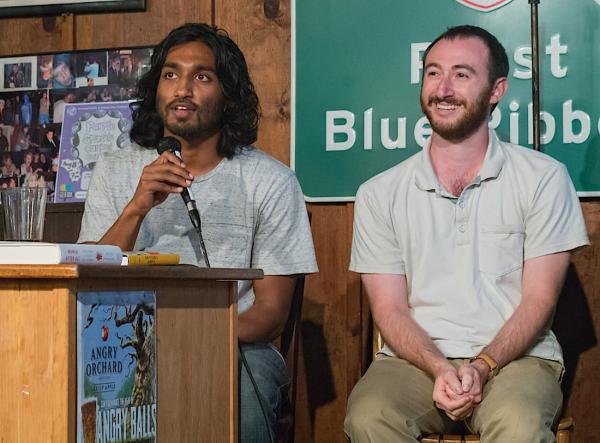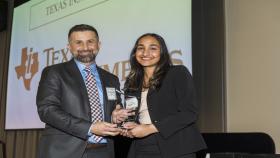Alex Weiss is an ardent advocate of the farm to table movement. He wants you to eat the freshest produce possible and to know where it came from. And he’s willing to do his part to see that it happens.
Weiss, a recent graduate of the Wallace H. Coulter Department of Biomedical Engineering is one half of an entrepreneurial team that created “replantable” (with a lower-case ‘r’) – a company that emerged from under the broad CREATE-X umbrella at the Georgia Institute of Technology.
Together with Ruwan Subasinghe, a recent mechanical engineering graduate, Weiss took part in Startup Summer, a 12-week accelerator program (part of the CREATE-X suite of entrepreneurial training programs) for Georgia Tech students and recent graduates who want to launch startup companies. These companies are based on the students’ own inventions and prototypes, and the program teaches participants to understand potential customers and the market so they can address real needs.
The “nanoFarm” (the lower case ‘n’ also is by choice) actually is replantable’s latest incarnation after the team pursued a winding road of ideas, all based around a similar theme.
“Everything we’ve done has been about trying to get the freshest food to the consumer,” says Weiss, who met Subasinghe during their freshman year. This past February, Subasinghe contacted Weiss and asked if he wanted to do a start-up together.
“He’d gotten into hydroponics and was growing strawberries, and I had a backyard garden in Philadelphia, where I’m from. So we both come from a background of growing stuff,” says Weiss, who was a member of Petit Institute faculty member Wilbur Lam's lab. “The first thing we talked about was live shipping, which would fundamentally change the food production industry.”
It involved the shipping of plants in hydroponic containers, preventing spoilage without the costly energy expense of refrigeration, reducing food waste as well as methane and carbon dioxide emissions. The concept, ‘Living Local,’ earned the team $2,500 with a runner-up finish in the Ideas to Serve competition, March 27 at the Scheller College of Business.
There was one significant challenge, though.
“We met with farmers and it would have been cost prohibitive for them,” Weiss says. “It didn’t make sense for them.”
Next they tried to remove the need for transportation altogether by growing produce on the roofs of grocery stores. They got a quick buy-in from Sevananda Market for their roof planting pallets. Weiss and Subasinghe got to be friends with the produce manager who told them, “I’ll take 40,” according to Weiss.
But then they started talking to professors in civil engineering and discovered that putting stuff on the roof was a big liability hurdle, and not within their realm of capability. What followed was a week or two of soul searching.
“We wondered what we were going to do,” Weiss says. “It was hell. But every startup I talked to has had this kind of week. It’s like, you know you’re going to get through it, but you don’t see any light until the light just hits you.”
Ultimately, it was a light-emitting diode, or LED, that hit them. They’d been focused on getting fresh food to consumers, and they finally asked themselves, Weiss says, “why not let the consumer grow it? We were working our way down the chain.”
Their first nanoFarm container concept was six feet tall, a couple of feet wide, utilizing hydroponics and LED lighting. The current model of the nanoFarm cube is 18 inches tall, about 12 inches wide and deep, and really easy to use. In other words, you don’t need a green thumb.
“We talked to more than 100 people who love fresh food, and their favorite part of growing was choosing what they wanted to grow, planting it, then harvesting it. In other words, not watering and weeding,” says Weiss, whose product requires the user to two basic things after sliding a sheet of seeds into the cube: fill it with water and close the door. Oh, then you’ve got to pick it before you eat it.
Weiss shows pictures of the produce he and Subasinghe have grown, indoors, out of the sunlight. Vivid greens and reds leap out of his smartphone, making the viewer hungry. The average apartment kitchen can easily accommodate several cubes.
Having graduated, Weiss and Subasinghe are now operating as the braintrust of replantable. They are engaged now in a beta test of their product and will soon launch a Kickstarter campaign. They want to be a success story on the path toward a sustainable and delicious lifestyle.
For more information, visit the replantable website here.
CONTACT:
Jerry Grillo
Communications Officer II
Parker H. Petit Institute for
Bioengineering and Bioscience
Media Contact
Jerry Grillo
Communications Officer II
Parker H. Petit Institute for
Bioengineering and Bioscience
Keywords
Latest BME News
Jo honored for his impact on science and mentorship
The department rises to the top in biomedical engineering programs for undergraduate education.
Commercialization program in Coulter BME announces project teams who will receive support to get their research to market.
Courses in the Wallace H. Coulter Department of Biomedical Engineering are being reformatted to incorporate AI and machine learning so students are prepared for a data-driven biotech sector.
Influenced by her mother's journey in engineering, Sriya Surapaneni hopes to inspire other young women in the field.
Coulter BME Professor Earns Tenure, Eyes Future of Innovation in Health and Medicine
The grant will fund the development of cutting-edge technology that could detect colorectal cancer through a simple breath test
The surgical support device landed Coulter BME its 4th consecutive win for the College of Engineering competition.








